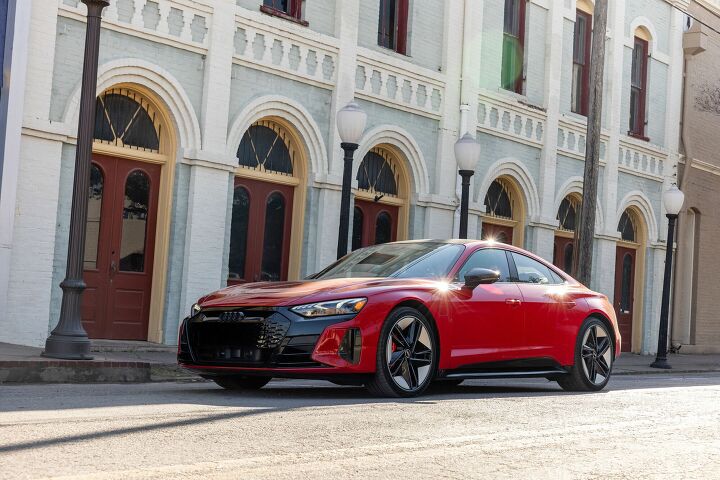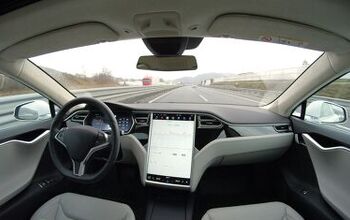Audi Sees More Battery Recalls, Porsche Likewise Impacted

Audi’s all-electric e-tron subbrand continues suffering from battery issues, with the company recently issuing a recall for the GT sedan and its zestier RS variant. The issue is that the high-voltage batteries equipped to the models might short circuit, posing a fire risk to owners and whatever they’ve parked their EV next to. The recall report stipulates that Porsche warned Audi of the possibility of “thermal events” after realizing that some Taycan models were suffering from battery defects.
The two models are mechanically similar and have identical battery modules, so Audi and its supplier (LG Energy Solution Wrocław) were effectively obligated to look into the matter. The companies are now recommending that owners only charge the vehicles up to 80 percent capacity to help mitigate fire risks.
Recalls have been on the rise generally in recent years with system integration issues outpacing faulty parts. As the industry continues pivoting toward “software defined vehicles,” we’ve seen an uptick in recalls and complaints pertaining to electrical issues. However, there’s often a fair bit of overlap now that so many vehicle components have been turned into drive-by-wire units or have to be networked together.
This has also resulted in battery issues due to the fact that an electric vehicle's state of charge and how it regulates charging is handled by the computer. In the past, we’ve seen automakers tweak an EV’s code via over-the-air updates to expand its range or mitigate charging when there’s a problem. While the practice opens a gigantic can of worms in regard to who actually is in control of the second most expensive thing you’ve ever bought, it likewise showcases just how much damage some bad software can do to modern automobiles.
Porsche and Audi seem to be suffering from both mechanical and software defects and opted to split their recalls into two groups. The first group doesn’t have a solution, hence the company suggesting customers don’t fully charge their vehicles as a safety precaution. It is supposed to affect an extremely small number of the total involved in the recall. For Audi, that was said to be about 1 percent of 1,013 units.
The other issue only impacts a couple dozen vehicles. But it was said to require a battery replacement in all instances due to assumption that they’re suffering from a mechanical defect. These cars were singled out after the company parsed through the battery data that’s transmitted from the vehicle back to the manufacturer.
Our guess is that Volkswagen Group doesn’t want to install any more batteries than it absolutely has to and is just trying to limit repairs to a software update on as many Porsche and Audi models as possible. The symptoms of both recalls are so similar that it seems unlikely that they’re not closely related. If we were to speculate, there’s a chance that the vehicles getting new batteries are simply too large of a risk to try and solve with a software flash.
At any rate, the companies involved have said they will continue to study telematics data to determine whether or not batteries will need to be replaced. Customers that do have to have work done in relation to this will be able to bring it in for repairs free of charge under the recall.
All impacted models appear to stem from the 2022-2023 model years with the defect appearing quite similar to the e-tron SUV recall from December. In that recall, the EVs were likewise using batteries manufactured by LG Energy Solution and were similarly at risk of thermal runaway. Even the solution was exactly the same. Audi planned on implementing a software update that more closely monitored the battery system and would advise drivers not to charge their vehicle beyond 80 percent if something appeared off.
Sadly, the company didn’t think it would have a comprehensive solution in place until fall of 2024 — which does not bode well for the recently recalled Porsche Taycan and Audi e-tron GT.
[Image: Audi]
Become a TTAC insider. Get the latest news, features, TTAC takes, and everything else that gets to the truth about cars first by subscribing to our newsletter.

A staunch consumer advocate tracking industry trends and regulation. Before joining TTAC, Matt spent a decade working for marketing and research firms based in NYC. Clients included several of the world’s largest automakers, global tire brands, and aftermarket part suppliers. Dissatisfied with the corporate world and resentful of having to wear suits everyday, he pivoted to writing about cars. Since then, that man has become an ardent supporter of the right-to-repair movement, been interviewed on the auto industry by national radio broadcasts, driven more rental cars than anyone ever should, participated in amateur rallying events, and received the requisite minimum training as sanctioned by the SCCA. Handy with a wrench, Matt grew up surrounded by Detroit auto workers and managed to get a pizza delivery job before he was legally eligible. He later found himself driving box trucks through Manhattan, guaranteeing future sympathy for actual truckers. He continues to conduct research pertaining to the automotive sector as an independent contractor and has since moved back to his native Michigan, closer to where the cars are born. A contrarian, Matt claims to prefer understeer — stating that front and all-wheel drive vehicles cater best to his driving style.
More by Matt Posky
Latest Car Reviews
Read moreLatest Product Reviews
Read moreRecent Comments
- Rover Sig 2021 Jeep Grand Cherokee Limited, like my previous JGC's cheap to keep (essentially just oil, tires) until recent episode of clunking in front suspension at 50K miles led to $3000 of parts replaced over fives visits to two Jeep dealers which finally bought a quiet front end. Most expensive repair on any vehicle I've owned in the last 56 years.
- Bob Hey Tassos, have you seen it with top down. It's a permanent roll bar so if it flips no problem. It's the only car with one permanently there. So shoots down your issue. I had a 1998 for 10 years it was perfect, but yes slow. Hardly ever see any of them anymore.
- 3-On-The-Tree 2007 Toyota Sienna bedsides new plugs, flat tire on I-10 in van Horn Tx on the way to Fort Huachuca.2021 Tundra Crewmax no issues2021 Rav 4 no issues2010 Corolla I put in a alternator in Mar1985 Toyota Land Cruiser FJ60 280,000mi I put in a new radiator back in 08 before I deployed, did a valve job, new fuel and oil pump. Leaky rear main seal, transmission, transfer case. Rebuild carb twice, had a recall on the gas tank surprisingly in 2010 at 25 years later.2014 Ford F159 Ecoboost 3.5L by 80,000mi went through both turbos, driver side leaking, passenger side completely replaced. Rear min seal leak once at 50,000 second at 80,000. And last was a timing chain cover leak.2009 C6 Corvette LS3 Base, I put in a new radiator in 2021.
- ChristianWimmer 2018 Mercedes A250 AMG Line (W177) - no issues or unscheduled dealer visits. Regular maintenance at the dealer once a year costs between 400,- Euros (standard service) to 1200,- Euros (major service, new spark plugs, brake pads + TÜV). Had one recall where they had to fix an A/C hose which might become loose. Great car and fun to drive and very economical but also fast. Recently gave it an “Italian tune up” on the Autobahn.
- Bd2 Lexus is just a higher trim package Toyota. ^^


































Comments
Join the conversation
Here
I am shocked a VAG product has problems with its' electrical system.